Wilno, Ontario
Wilno is a settlement in the Township Municipality of Madawaska Valley, Renfrew County, Ontario, Canada.
Wilno | |
|---|---|
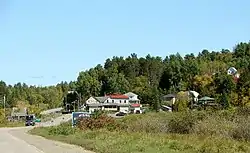 Wilno, Ontario. | |
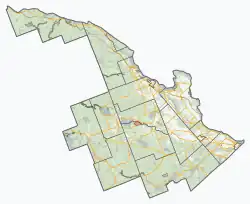 Wilno 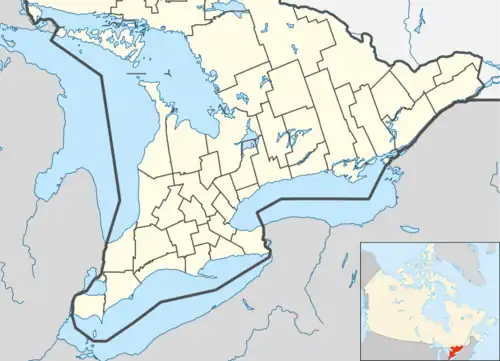 Wilno | |
| Coordinates: 45°30′41″N 77°33′37″W | |
| Country | |
| Province | |
| County | Renfrew |
| Municipality | Madawaska Valley |
| Settled | 1858 |
| Time zone | UTC-5 (EST) |
| • Summer (DST) | UTC-4 (EDT) |
| Postal Code | K0J |
| Area code | 613 |
| Website | www |
Geography
Wilno is nestled in the rolling, picturesque terrain of the Madawaska valley which was largely shaped during the demise of the Laurentide Ice Sheet at the end of the last North American Ice Age.
History
Wilno is the first and oldest Polish-Kashubian settlement in Canada. Most of the original settlers in the area came around 1858 from the Polish cultural region of Kashubia. (Prussia had annexed the region from Poland in 1795, but it is now part of Poland again.) They are an integral part of the Kashubian diaspora.[1]
One of the reasons that they chose the area was that the landscape reminded them of their original homes.

Wilno's namesake was the city of Vilnius, known in Polish as Wilno, which was then in Russian Empire in area that used to belong to Polish–Lithuanian Commonwealth and is now the capital of Lithuania. The city was a birthplace of Reverend Ludwik Dembski, who was a prominent community spiritual leader and town founder, who would not have wanted the town named after himself. Therefore, the townsfolk, grateful for his contributions to their town, may have suggested the name of Wilno.[2][3]
The St. Stanislaus Kostka Church was built in 1875, destroyed by fire in 1936 and rebuilt as Saint Mary - Our Lady of Czestochowa. later renamed St. Mary's Catholic Church. The first general store and post office was initially operated by Adam Prince, who became the community's first postmaster in 1885; the settlement was initially named Princetown before being renamed Wilno. Flora's Store was started by Flora Bank in 1937; it was destroyed by fire in 1940 but rebuilt. The business went through several owners and changes but was closed down in 2015.[2][4]
In 1894, the Canadian Atlantic Railroad arrived in the Madawaska Valley.[2] Previously, John Rudolphus Booth's Ottawa, Arnprior and Parry Sound Railway ran through the town mainly serving the lumber industry. The first hotel near the Wilno rail station was the "Stopping Place." Anew owner added more rooms and a dining room, and renamed it the "Exchange Hotel." Subsequent owners modified the property, which became the "Wilno Tavern" in 1979 and the "Wilno Tavern Restaurant" more recently.[2] The restaurant remained in operation as of 2020, and Corinne Higgins has owned it since 1981.[5]
The former train route has now been redeveloped into a recreational path. The former train station has an early settler building and museum presenting the early history of the town. The museum and open air wooden skansen (Polish: "open-air museum") contain the history of the first Kashubian people as well as their immigration to Canada, freedom and, after many hardships, their settlement journey to the Wilno area. The Polish Kashub Heritage Museum & Skansen opened in 2002. It is open to visitors during July and August. In May, the annual Kashub Day event is held here.[6][7][8]
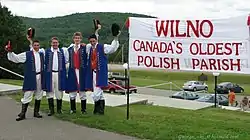

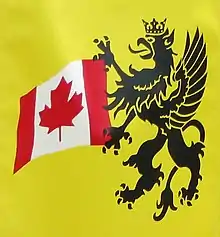
A professor of Slavic Languages, Jan L. Perkowski, reported on rumours of vampires in the Kashubian culture in a study completed in 1969, and published in a paper titled "Vampires, Dwarves, and Witches among the Ontario Kashubs".[9] According to the professor, the Ontario Kashubs believed that one "must open the tomb of the vampire at midnight, and drive a long nail into his forehead, or, better still, cut off his head with a sharp spade and put it between his feet....".[10] In 1973, a Catholic priest in Wilno told CBC News that "We get a big laugh out of it, we know the people who have manufactured the story just by reading it... My impression is that [Perkowski] probably stuck a microphone under their noses and to get rid of him they'd made up these tales".[10]
In April 2010, Poland's Prime Minister Donald Tusk agreed to visit Wilno but an airplane crash, the Smolensk air disaster, that took the life of President Lech Kaczyński, and that of 95 others, led to cancellation of the plan.[11] Tusk visited Wilno in May 2012, commenting that he was the "first Polish prime minister to meet with the minority living there and cultivating its customs since the 19th century".[12][13] He toured the Catholic cemetery and later said, "We felt as if we were visiting the graves of our dearest, our relatives, our beloved, because these names, these figures, those stories were our stories."[14]
In September 2015 three women; Carol Culleton, 66, Anastasia Kuzyk, 36, Nathalie Warmerdam, 46 were murdered in and near Wilno. The killer, Basil Borutski, was convicted of the crimes in 2017.[15]
Historical plaque
The government of Ontario erected a historical plaque in Wilno, providing these specifics:[16][17]
The first group of Polish immigrants to Canada, some 300 in number, established a settlement in this area in 1864. Adverse social conditions and political unrest in their partitioned homeland had encouraged them to leave. They cleared the land and rapidly established a thriving agricultural community. During the 1880s the village founded here was called Wilno after the birthplace of the Reverend Ludwik Dembski one of their spiritual leaders. In 1875 the parish of Wilno was organized and a chapel dedicated to the polish saint Stanislaus Kostka, was built. The Canadian Atlantic Railway linked Wilno with Ottawa in 1894. This district, which received a new wave of Polish immigrants in the early 1900s, retains much of its cultural heritage.
Annual Chicken Supper on the Labour Day Weekend
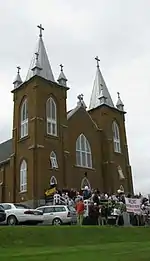
This supper has been an annual event since 1936. Approximately 2,000 people have been served each year during Labour Day Weekend. The food is authentic Kaszebe–Polish fare; one source states that it includes "boiled chicken, mashed potatoes, gravy, fresh vegetables, such as carrots, cucumbers, tomatoes, pickles, and of course choices of apple, raisin, and coconut cream pies".[18] In 2019, some 3,000 meals were served by volunteers; the 550 pies were also baked by volunteers.[19]
Notable people
- Aloysius Rekowski (1921–2006), priest and historian
References
- Blank, Joshua C. Creating Kashubia: History, Memory and Identity in Canada's First Polish Community. (Montreal and Kingston: McGill-Queen's University Press, 2019
- "Stories of Wilno". wilno.com. Archived from the original on 2023-05-31. Retrieved 2020-08-16.
- Canada's First Polish Settlement
- Witómë w Wilno - Witamy w Wilno - Welcome to Wilno
- Dining Out With History
- The sun shines on Kashub Day 2019
- Discover Canada's Polish Kashub Heritage
- Wilno: A little slice of Poland in the Madawaska Valley
- "How to Kill a Vampire: An excerpt (and guide) from Liisa Ladouceur's book of the same name". National Post. 2013-10-31. Retrieved 2020-08-16.
- Demeter, Susan. "The Vampire in Ontario - Wilno's Vampiric Legends". ParaResearchers.org. Archived from the original on 2023-06-05. Retrieved 2020-08-17.
- "Polish tragedy puts cloud of sorrow over Ottawa Valley". CTV News. 2010-04-12. Archived from the original on 2023-08-22. Retrieved 2020-08-17.
- PM Tusk on Canada visit
- dents-may-13-news-photo/144370350 Polish Prime Minister Donald Tusk
- Milewski, Terry (2012-05-15). "Polish PM's visit stirs emotions on Parliament Hill". CBC News. Archived from the original on 2017-02-02. Retrieved 2020-08-17.
- Nease, Kristy (2017-11-25). "Basil Borutski guilty of murdering 3 women in shocking killing rampage". CBC News. Archived from the original on 2023-06-28. Retrieved 2020-08-16.
- Canada's First Polish Settlement
- Wilno, Ontario – Canada’s First Polish Settlement
- "Wilno Events". wilno.com. 2017-05-06. Archived from the original on 2023-05-31. Retrieved 2020-08-16.
- Jones, Mark (2019-09-03). "Thousands flock to annual chicken dinner". The Valley Gazette. Barry's Bay, Ontario. Archived from the original on 2021-09-24. Retrieved 2020-08-17.